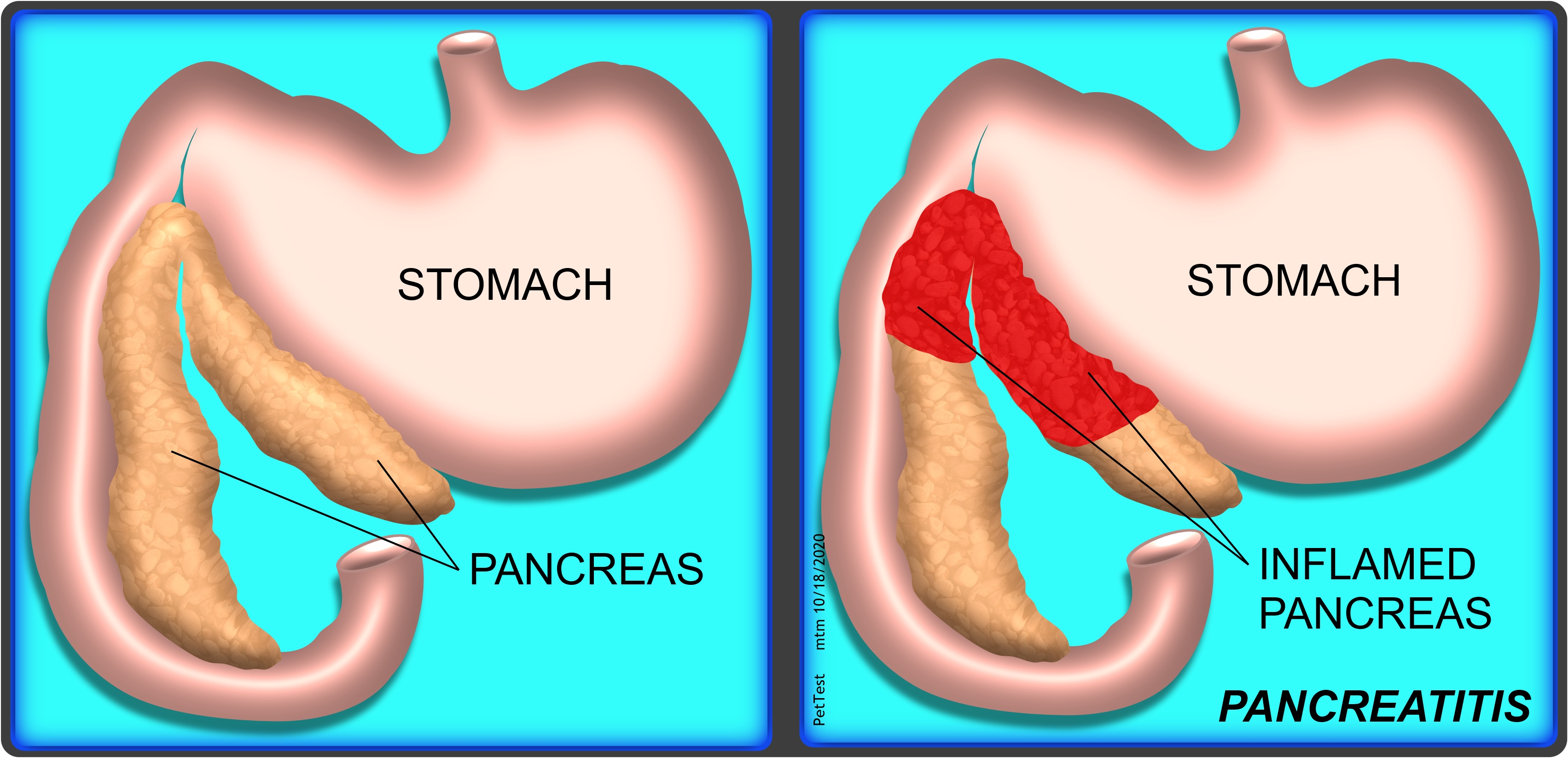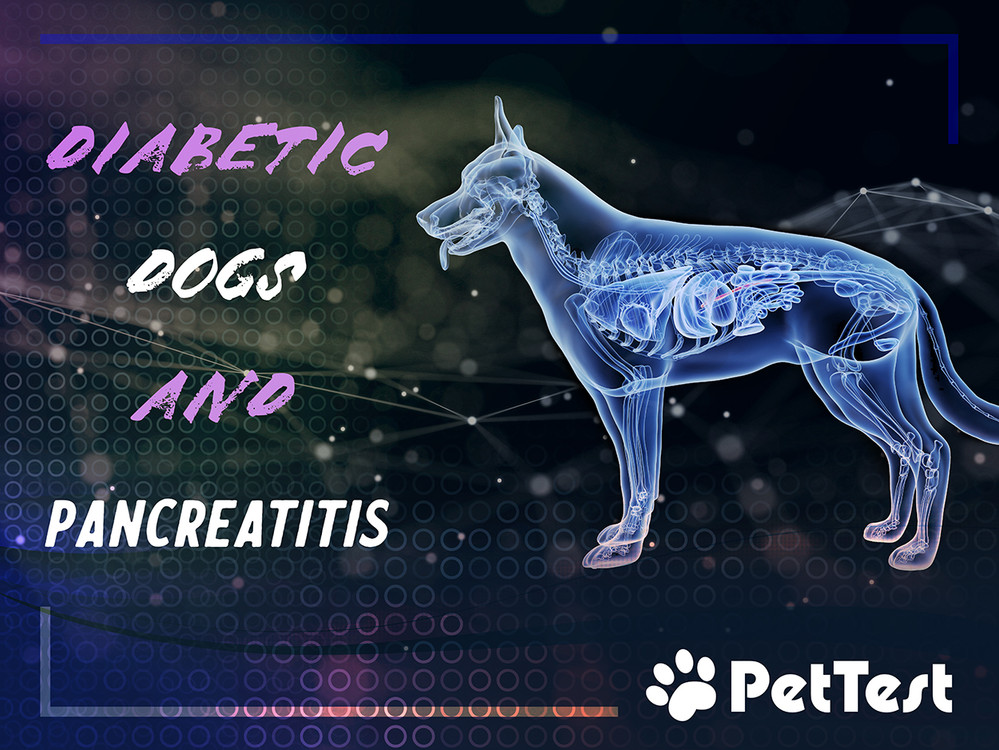By now we all know that our dog’s pancreas has malfunctioned due to diabetes diagnosis. Many of us have also had our diabetic dogs diagnosed with pancreatitis as well. Statistics show that 28 – 40% of diabetic dogs have had pancreatitis, that is a staggering number and a major reason we constantly talk about low-fat diet in our Facebook group Diabetic Dog Owners.
Today I want to go over what the pancreas does, causes of pancreatitis, symptoms and treatment for pancreatitis. For more in-depth conversation about the functions of the pancreas please read my earlier blog Functions of the Canine Pancreas.
The pancreas is part of the endocrine system and the exocrine system. The endocrine system produces hormones. The exocrine system produces sweat, enzymes, mucus.
Endocrine function of the pancreas produces hormones that regulate blood glucose levels, insulin and glucagon. Due to the destruction of beta cells in the pancreas, the pancreas produces little or no insulin and causes diabetes mellitus. This is considered type 1 diabetes and insulin therapy is required to live.
Exocrine function of the pancreas produces digestive enzymes that break down foods in the small intestine for nutrient absorption. Enzymes that exocrine cells make are as follows:
- Amylase enzymes break down starches.
- Lipase enzymes break down fats.
- Protease enzymes break down proteins.
What is pancreatitis?
Pancreatitis is inflammation of the pancreas. Digestive enzymes are activated in the pancreas due to damage or outflow blockage and the activated enzymes destroy pancreatic tissue. Pancreatitis is a very painful and serious illness that requires immediate treatment.

What are the causes of pancreatitis?
- Diet – high fat
- Medications
- Endocrine disorders
- Obesity
- Trauma
- Cancer
- Hyperlipidemia
- Tumors
What are the symptoms of pancreatitis?
Your dog can exhibit little symptoms or many symptoms depending on the severity of pancreatitis. Symptoms are as follows:
- Lack of appetite
- Lethargy
- Vomiting
- Diarrhea
- Hunched (praying position)
- Abdominal pain (tender to the touch)
- Shaking / trembling
- Dehydration
- Restless / agitation
- Unable to stand (acute pancreatitis)
- Shock (acute pancreatitis)
How is pancreatitis diagnosed?
- SNAP cPL (canine pancreas-specific lipase) – this is an in-house test that gives results quickly. Should not be used alone to diagnose pancreatitis.
- Blood panel including CBC (complete blood count)
- cPLI (pancreatic lipase immunoreactivity) test – this detects lipase that is produced in the pancreas.
- Ultrasound
- X-ray
What is the treatment for pancreatitis?
Depending on the severity of the pancreatitis, the dog can be treated at home or in the hospital. Mild cases can often be treated at home with success while acute or severe cases are treated in the hospital.
- Low-fat diet (under 10% on a dry matter basis)
- Pain medications
- Antibiotics
- Anti-nausea medication
- Acid reducers
- Anti-diarrhea medication
- Fluids – either subcutaneous (SC) or intravenous (IV)
- Smaller meals given multiple times per day (three to four times per day vs. two times per day)
With proper treatment and a low-fat diet your dog can heal from pancreatitis. A low-fat diet should be fed on a permanent basis since a pancreatic dog is more prone to recurrent cases of pancreatitis.
Low-fat diets should be no more than 10% fat on a dry matter basis (DMB) for dogs with pancreatitis or chronic pancreatitis. Diet for a dog that has had pancreatitis should be 12% fat on a DMB.
When Lucy was diagnosed with diabetes she was also diagnosed with severe pancreatitis. Lucy was so ill with pancreatitis that I did not think she was going to survive so she was taken care of at home, I got a crash course on giving subcutaneous fluids, the necessary medications and a very low-fat diet. Luckily Lucy healed quickly, and never had a confirmed case of pancreatitis again.
I hope this blog has been informative and educational, and I hope you have a better understanding of pancreatitis. Do you have questions or want to add something? Comment below to get a conversation going!
For more conversations, photos, and giveaways check out PetTest on Facebook and Instagram.
If you are looking for a community to join for support, I have been an admin for over four years in Diabetic Dog Owners. Canine Diabetes Support and Information can be found on Facebook as well.

